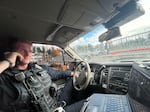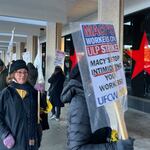
Police in Bellevue, Wash., arrest a man accused of stealing a pair of white Nike shoes. The cops were on a stakeout outside the local mall, texting back and forth with store security to identify and apprehend suspected thieves.
Martin Kaste / NPR
There’s been a lot of anger and frustration about retail theft in recent years, especially as viral videos of smash-and-grab crimes proliferate online. But lately, when you talk to people who work in the retail “loss prevention” world, they’re surprisingly ubpeat.
"There's definitely been some progress made," says Tony Sheppard, vice president of retail risk solutions for ThinkLP. He's worked in the industry for decades, starting out as a store detective at Montgomery Ward. He sees new energy in law enforcement efforts to combat this type of theft.
"The INFORM act passed," he says, referring to a new federal law requiring platforms such as Facebook Marketplace and OfferUp to collect more information about high-volume sellers — and help identify those who are fencing stolen merchandise.
Sheppard is also cheered by states that have started interagency task forces to track organized retail crime rings. California, especially, has ramped up its spending on such investigations, supported by the California Highway Patrol.
"I'd like to think that we can hopefully start getting back to normal," says CHP Capt. Jeff Loftin, with the organized retail crime task force in the Los Angeles area. His group has doubled in size in the past couple of years. "Shoplifting is always going to be a thing, but hopefully it won't be so brazen, where people feel comfortable."
Many in law enforcement believe retail theft has been driven partly by a sense of impunity, fed by videos of people walking out of stores with piles of merchandise while staff look on. They also blame the pandemic, when many jurisdictions were less likely to jail suspects for property crimes.
"What they're trying to do now is, they're putting the word out," says Sgt. Casey Hiam of the police department in Bellevue, Wash. It's a shopping-rich suburb near Seattle, where officers do stakeouts near stores with chronic shoplifting problems.

Sgt Casey Hiam of the Bellevue. WA police department on an anti-shoplifting stakeout operation during the holiday shopping season
Martin Kaste / NPR
They lurk in unmarked police cars — the Toyota "dad mobile" minivan is especially deceptive — and wait for texts from the loss prevention staff inside stores.
The staff tell the cops when they're watching someone, and if that person walks out without paying, they text the word "green."
"Yup — and he's green," Hiam says, radio beeping, when the cops get the signal during a recent four-hour mall stakeout. "All right, we're green on this guy as he comes out. Going towards Panera!"
They catch a small man in droopy jeans suspected of stealing a pair of white Nikes. He gives up meekly — he has a police record — and is cuffed and sent off to be booked.
"This type of [operation] is like duck-hunting," Hiam says. Cops have to sit patiently and wait for a few thieves to come to them.
"It's labor-intensive and time-consuming," he adds, and police can't do these staeouts more than a couple times a week. But it's also the only sure-fire way to have an officer on the spot the moment someone steals something.
"Humans talk about experiences, criminals talk about experiences," Hiam says, "and hopefully they're communicating back to each other that, 'Well, don't go to Bellevue because they're proactively out there, and if you get caught, you are going to jail, even if you do steal just a pair of shoes.' "
Despite the andecdotal sense that retail theft has grown worse in recent years, hard numbers are elusive. One reason for this is that stores vary widely in how they respond to theft — and whether they report it at all. Hiam recalls conversations he's had with store managers who've asked police for stakeout operations.

Employees picket a Macy's store in Tukwila, Wash., demanding higher pay and more security against retail thieves.
Martin Kaste / NPR
"I'm like, 'You haven't called the police in three months, and you're saying you're getting pillaged all the time, but I don't have any case reports for you guys!'" he says. "So how can I go and pay attention to your parking lot or your store if you're not calling us?"
While police reports are spotty, the National Retail Federation's annual survey suggests store managers think the problem has become worse. Some 78% of respondents said organized retail crime was more of a priority for them this year than last; about 69% said the same of other kinds of "external" theft.
The more complicated question is, who's responsible? While retail groups point to understaffed police departments that are less able to respond to property crimes, police say retailers could do more to protect their inventory. For instance, they should stop putting popular items near entrances, especially during Black Friday.
A growing number of stores also discourage their staffs from stopping the thieves. More than 41% of companies in the NRF survey said no employees in their stores are allowed to stop or apprehend shoplifters.
The reason for this is usually a fear of the violence and liability that could come from such confrontations. Stores have the option of spending more money on trained security, but guards are expensive and off-duty police are even more so. Some retailers have decided the stolen merchandise would cost them less in the long run.
Workers at Macy's stores in the Seattle area see this equation somewhat differently. They went on a brief strike last week, demanding higher pay and more security guards.
"We have these 'Chanel girls' that come in and steal thousands of dollars in Chanel," says Jeanne Peterson, who works at the fragrance counter at the Southcenter Macy's, near Seattle. "They will show their pepper spray or they will spray you. What we've been trained to do is to let them come behind the counter and let them take what they want to take."
Some employees who went on strike want more armed guards, especially in the more isolated corners of the store, and some say they're angry at Macy's for disciplining employees who've tried to resist thieves or call the police.
In a statement to NPR, Macy says, in part, that "our top priority is to ensure the safety of our colleagues and customers in-store."
But Kathy Henderson says that's not how it feels for salespeople like her. She says Macy's suspended her because she briefly pulled back on a box of perfume when a shoplifter tried to take it. Asked why she should care whether someone gets away with the company's merchandise, she says it's because it's just so hard to live with, day after day.
"It's total anxiety," Henderson says. "If we hear a loud noise or if there's a whole bunch of people talking loud or whatever, it's like PTSD."
Copyright 2023 NPR. To see more, visit https://www.npr.org.